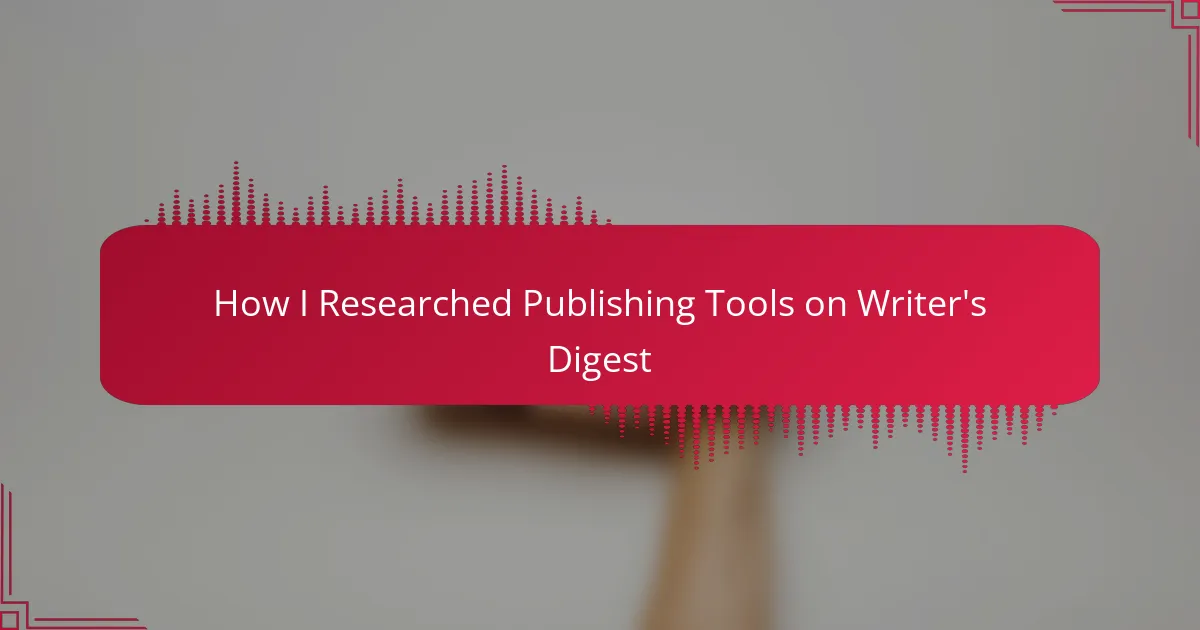Key takeaways
- Publishing tools streamline the writing and publishing process, helping authors focus on creativity rather than technicalities.
- Researching tools on platforms like Writer’s Digest offers valuable insights and community support, enhancing the understanding of various publishing avenues.
- Effective publishing tools should be user-friendly, versatile, and provide robust support resources to empower writers.
- Choosing the right tool requires evaluating specific needs, focusing on features tailored for comic book authors, and considering usability and collaboration options.
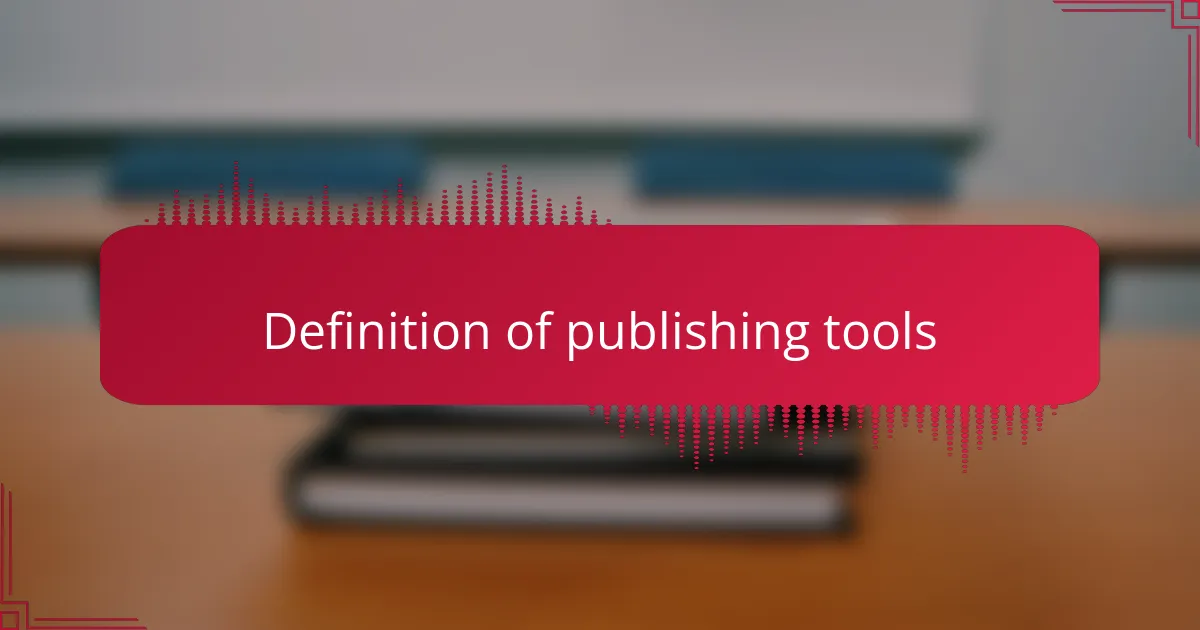
Definition of publishing tools
Publishing tools are essential resources that help authors transform their manuscripts into polished and marketable works. These tools can range from simple editing software to comprehensive platform solutions that assist with formatting, distribution, and promotion. I remember the first time I discovered a great editing tool; it felt like I had unlocked a secret weapon for refining my writing.
When I think about publishing tools, I can’t help but feel a sense of relief at how they streamline the often overwhelming process of getting a book out into the world. Have you ever felt lost in the intricacies of publishing? Many writers share that same sense of confusion, making these tools invaluable for simplifying tasks and allowing us to focus on our creative journey.
In my experience, the right publishing tools not only enhance the quality of a comic book but also provide a supportive framework that empowers authors like us. Whether it’s layout design, cover creation, or distribution planning, these tools serve as crucial allies that can significantly impact how our stories reach readers. Without them, navigating the publishing maze would be daunting, wouldn’t it?

Overview of Writer’s Digest
Writer’s Digest has long been a cherished resource for writers across various genres, including comic book authors like myself. It offers a diverse range of articles, advice, and tools that can elevate a writer’s craft. I vividly remember stumbling upon their comprehensive guides on publishing tools—it felt like uncovering a treasure chest filled with gems that could refine my storytelling and publishing process.
When researching publishing tools on Writer’s Digest, I found several key elements that stood out:
- In-Depth Articles: They cover everything from self-publishing to traditional routes.
- Expert Advice: Contributions from seasoned authors provide invaluable insights.
- Resourceful Blogs: Regularly updated content keeps writers informed on industry trends.
- Community Interaction: Forums allow for sharing experiences and getting feedback.
- Webinars and Workshops: Opportunities to learn directly from experts and industry leaders.
Diving into these resources not only enriched my knowledge but also gave me a sense of belonging within a larger writing community.
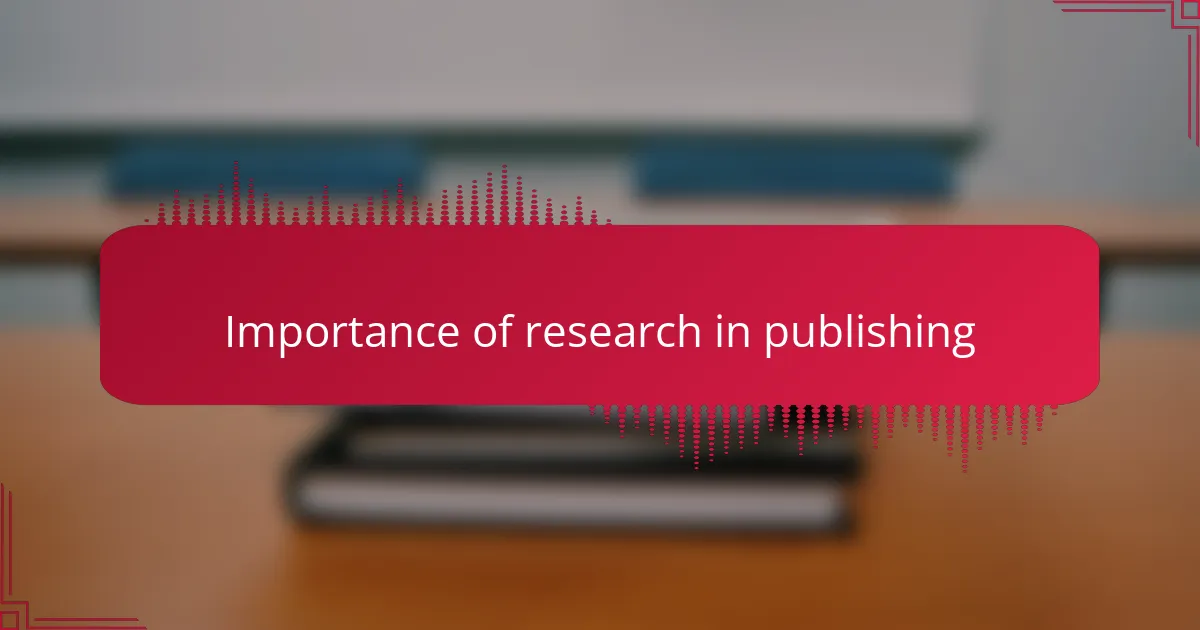
Importance of research in publishing
Research plays a crucial role in the publishing process. It’s the difference between just another manuscript and a well-polished, market-ready comic book. For me, diving deep into various publishing tools and options on platforms like Writers Digest opened my eyes to what was truly available. It felt like walking into a treasure trove of guidance and strategies that could elevate my work.
In my experience, the time invested in understanding different publishing avenues translates to better decisions. I remember when I was uncertain about self-publishing versus traditional methods. By researching authors’ experiences and insights on Writers Digest, I learned the nuances of each path, which ultimately informed my decision-making and gave me immense confidence.
- Understanding different publishing models (self-publishing, traditional publishing, hybrid)
- Gaining insights from successful authors’ stories and advice
- Evaluating tools that streamline the publishing process
- Learning about marketing strategies tailored for comic book authors
- Discovering community support and networking opportunities available in the publishing realm
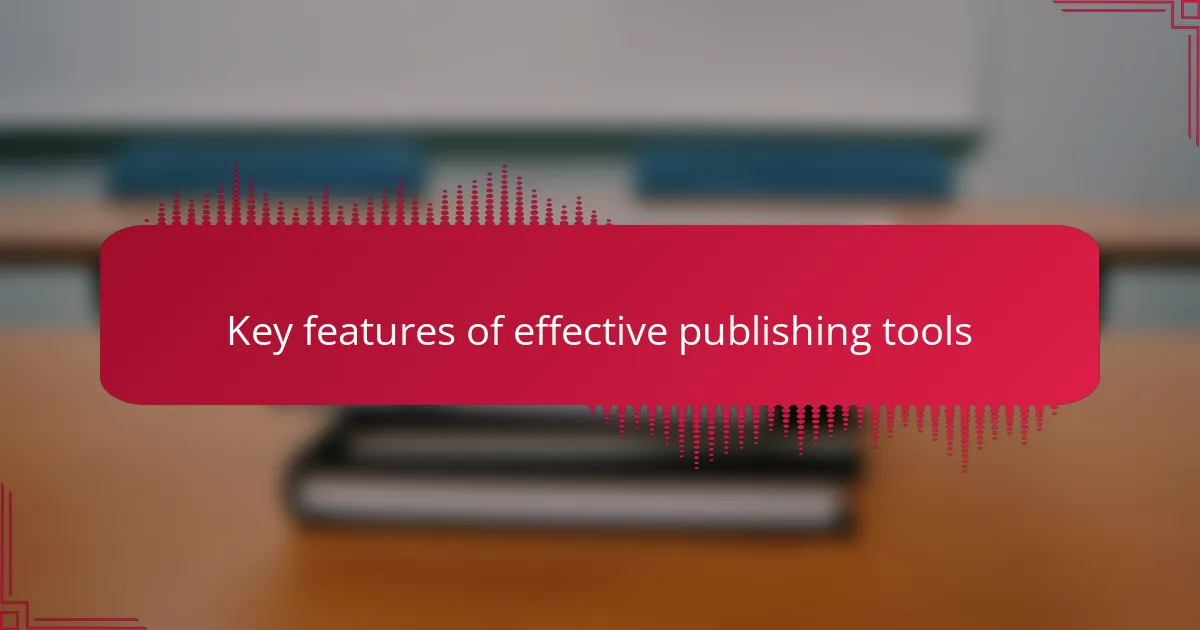
Key features of effective publishing tools
Effective publishing tools share several key features that can significantly enhance a writer’s journey. One essential aspect is user-friendliness; I’ve often found that the easier a tool is to navigate, the more it empowers me to focus on my writing rather than getting bogged down in technicalities. Have you ever tried software that felt like a maze? It’s frustrating, and it stifles creativity.
Another important feature is versatility. The ideal publishing tool should adapt to various needs—be it formatting, editing, or marketing. I remember when I discovered a single platform that handled everything from layout design to distribution; it felt like I was finally equipped for the entire publishing journey. This all-in-one approach not only saves time but also creates a seamless experience that allows writers like me to concentrate more on storytelling.
Additionally, robust support and resources are invaluable. I cherish tools that come with tutorials, forums, or even customer support, as these features cultivate a sense of community and reassurance. When I faced a sudden issue with formatting, a quick search in a forum full of knowledgeable writers provided the answer. That sense of camaraderie and support is what really amplifies the effectiveness of publishing tools, don’t you agree?
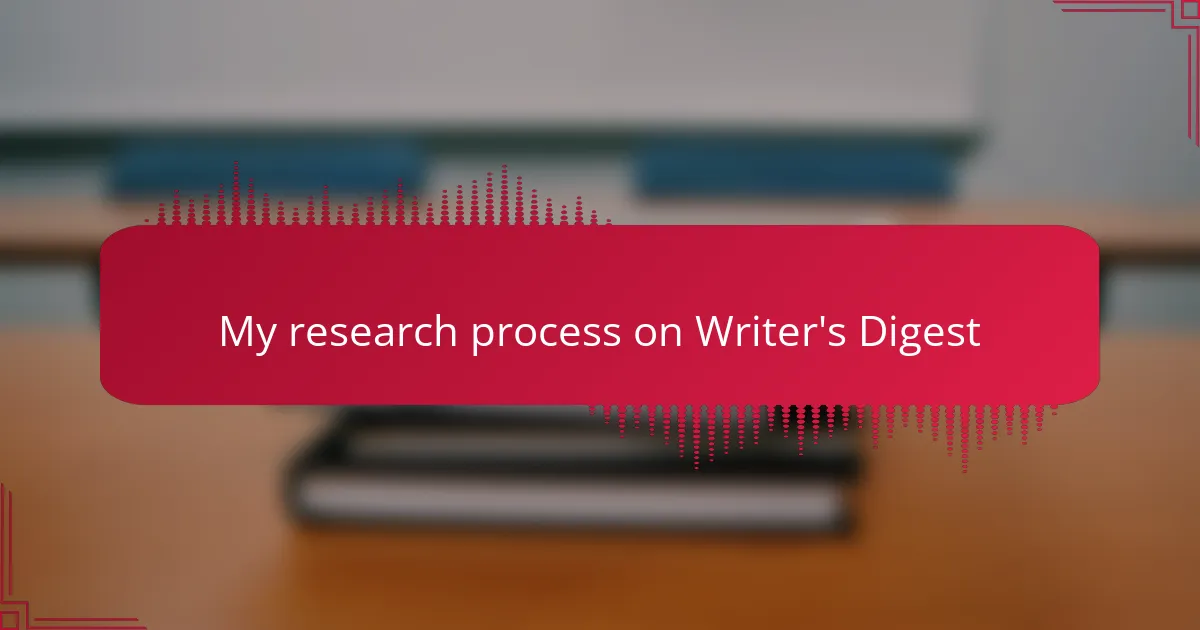
My research process on Writer’s Digest
When I set out to research publishing tools on Writer’s Digest, it was an intriguing journey. I started by exploring their extensive articles and guides, which are treasure troves for writers. The real gem, however, was the community engagement—seeing fellow writers share their experiences and tips added a rich layer to my understanding.
As I sifted through the content, I took notes on the tools that resonated with me, both in terms of utility and user reviews. I discovered that many writers found specific tools beneficial for their unique workflows. This variety not only helped me identify potential tools to use but also sparked creativity about how I might approach my comic book projects differently.
Lastly, engaging with Writer’s Digest’s resources felt empowering. It was like having a mentor right at my fingertips, guiding me through the maze of publishing options available today.
| Publishing Tool | User Experience |
|---|---|
| Scrivener | Highly recommended for organization and project management |
| Reedsy | Valuable for professional design and editing services |
| Pressbooks | Great for those looking to self-publish with user-friendly formats |
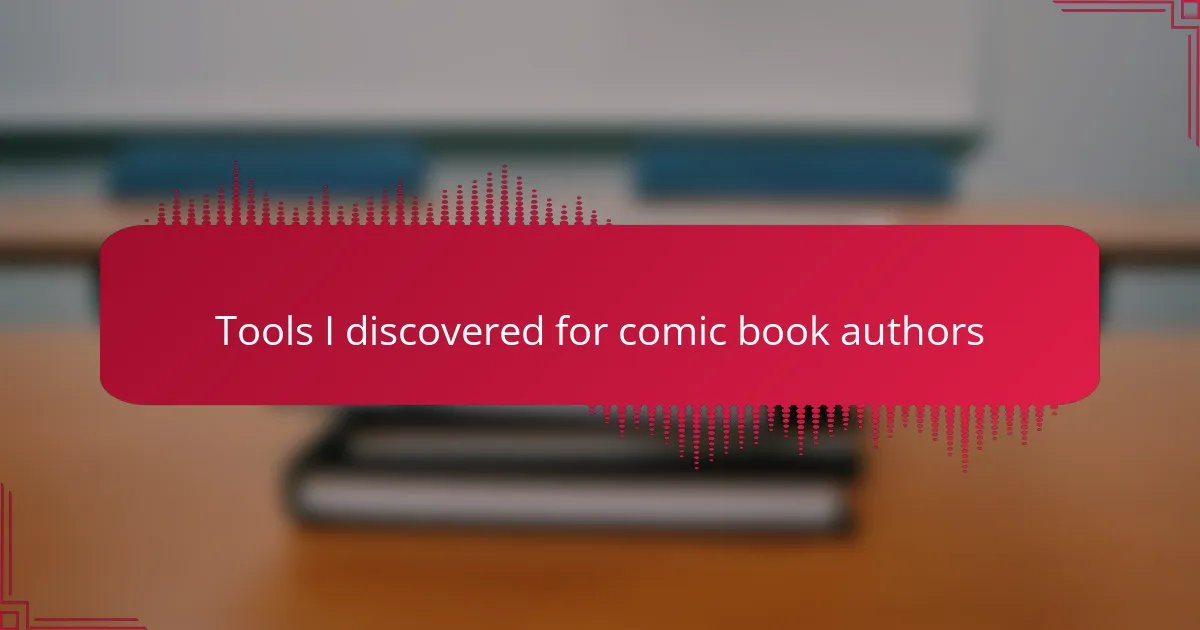
Tools I discovered for comic book authors
Diving into the world of publishing tools specifically for comic book authors was an enlightening experience for me. I recall the initial confusion I felt when trying to navigate the myriad options available. However, discovering tools tailored to the unique needs of comic creators truly empowered me to refine my craft and streamline my workflow.
Here are some standout tools that I found particularly useful:
- Canva: This user-friendly design platform allows for creating vibrant layouts and promotional material without needing advanced graphic design skills.
- Clip Studio Paint: Ideal for comic artists, this tool offers versatile drawing features along with comic panel templates that save valuable time.
- Trello: A project management tool that helps organize storylines and schedules – it kept my creative process on track when I was overwhelmed with ideas.
- Comic Life: Perfect for assembling your comic strips; its drag-and-drop feature makes it easy to combine sketches and dialogue seamlessly.
- Evernote: A note-taking app where I store scripts and inspiration snippets, ensuring that no idea slips away.
These tools transformed my creative journey and made the technical side of publishing feel a lot less daunting.

How to choose the right publishing tool
Choosing the right publishing tool is crucial for comic book authors. I remember when I first ventured into publishing my comics; the process felt overwhelming with so many options available. It took time, but I realized that understanding my specific needs as a creator was essential to narrowing down the choices.
When I looked into different publishing tools, I focused on their features, usability, and support for visual content. It was eye-opening to discover that certain platforms catered better to the comic format, helping me enhance my storytelling through visuals. Here are some key aspects I considered during my research:
- User Interface: Is it intuitive and easy to navigate?
- Comic-Specific Features: Does it support formats like panel layouts and speech bubbles?
- Collaboration Tools: Can I easily work with artists or co-writers?
- Publishing Options: What formats can I publish in (digital, print)?
- Cost: What fits my budget without compromising quality?
- Community Support: Are there forums or resources for help and advice?
